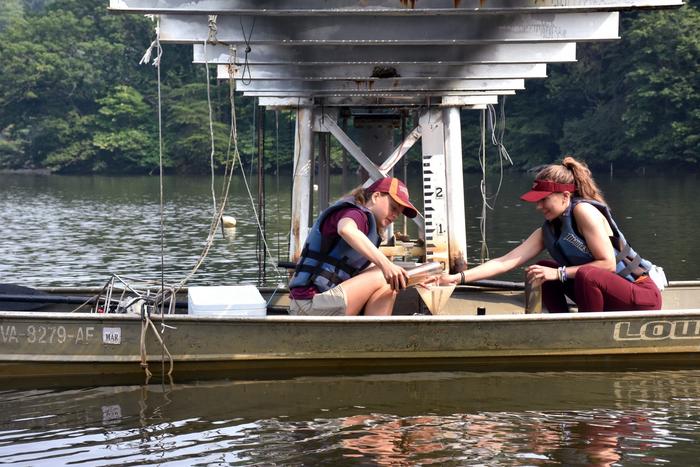Abigail Lewis traveled all across the United States for college and graduate school, and she ended up researching lakes in her own hometown.

Credit: Courtesy Virginia Tech
Abigail Lewis traveled all across the United States for college and graduate school, and she ended up researching lakes in her own hometown.
For one of her graduate research projects, Lewis analyzed 656 lakes across five continents with an international research team. The lakes in her hometown of Waukesha, Wisconsin, were among those included.
“To look back and pull together these two parts of my life has been really satisfying,” said Lewis, who will earn her Ph.D. in biological sciences this spring.
In a paper recently published in Global Change Biology, Lewis and her team provide empirical evidence supporting a theory that low deep-water oxygen concentrations in a given year perpetuate a continued cycle of low oxygen, also known as anoxia, in following years. This is known as a positive feedback.
Of the total lakes studied, 356 had 10 years of data, and from these the team found 34 percent crossed the threshold of going from oxic, or with oxygen, to anoxic. Only 90 lakes of these 356 analyzed never experienced a year of anoxia.
This diagram shows the positive feedback cycle where low oxygen concentrations in the deep waters perpetuates a continued cycle of low oxygen. Image courtesy of Abigail Lewis.
“We document a positive feedback where low oxygen conditions in the bottom waters of lakes around the world lead to increased algal growth and the decomposition of algae further promotes oxygen declines,” said Lewis, who is also an Interfaces of Global Change Fellow.
Algae blooms affect the water quality and disrupt the ecosystems of lakes. They can be toxic to humans, lead to the release of metals such as arsenic, and lead to massive fish kills. Deep-water anoxia leads to the release of phosphorus from sediments, which exchanges with the well-lit surface waters and contributes to algae blooms.
“It’s especially important to prioritize conservation efforts for lakes that are approaching the threshold of experiencing anoxia but are not quite there yet,” Lewis said. “Any efforts that are dedicated to stopping the problem from happening in the first place are worth substantially more than efforts to try and restore a lake after problems have already happened. Once you start having frequent algal blooms, it’s almost too late.”
Two factors can influence whether a lake becomes anoxic: climate change and land use.
“Climate change on a long-term time scale is within our control, on a short-term time scale it’s not. The land-use decisions that we make are potentially really important because that’s something that we can control on a short-term time scale,” Lewis said.
While interventions were not a part of this study, researchers have long known that low oxygen conditions can cause water quality problems, so they already have a stash of interventions to prevent lakes from becoming anoxic. However, Lewis and her team’s empirical evidence for a positive feedback effect will help researchers and water managers gain support from the public.
Lewis’ dip into this lake of research began during her first semester of graduate school in 2019, when she attended an international conference on lake ecology and participated in a working group session. She and her team are members of the Global Lake Ecological Observatory Network (GLEON).
“GLEON is an amazing group of lake scientists from all around the world, and they have a supportive culture where they encourage early career scientists to step up and take the lead on projects,” Lewis said.
Lewis’s advisor is Cayelan Carey, professor of biological sciences in the College of Science as well as a Global Change Center and Fralin Life Sciences Institute affiliated faculty.
Going forward, Lewis is pleased that the data gathered from the research will be disseminated internationally.
“We have 22 authors from around the world, so this information is going to go out globally to help spread the word,” Lewis said. “That’s optimistic.”
Journal
Global Change Biology
DOI
10.1111/gcb.17046
Method of Research
Data/statistical analysis
Article Title
Anoxia begets anoxia: A positive feedback to the deoxygenation of temperate lakes
Article Publication Date
6-Dec-2023




